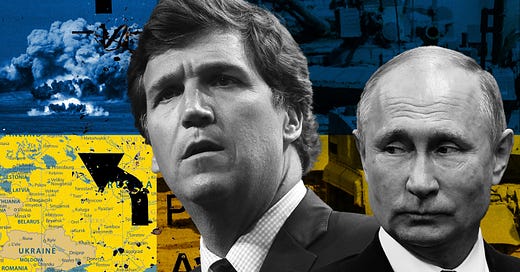It seems the world’s worst kept secret is causing not just America's but the global media to lose their collective minds.
Carlson’s Tour de Moscow, featuring his upcoming interview with Russian President Vladimir Putin, has sparked a firestorm of debate and controversy.
However, the announcement of the interview with Putin should hardly be a surprise.
In early 2023, Carlson, in an interview with former US Democratic Presidential candidate Tulsi Gabbard, revealed the NSA had tapped his phone and knew of his discussions with Moscow about planning the Putin interview.
Against a backdrop of heightened tensions between Russia and the West, Carlson’s interview promises to be a pivotal moment in global media coverage.
What makes Carlson’s acquisition particularly fascinating is that the interview will provide direct insight into the motivations and perspectives of one of the world's most enigmatic figures, regarding the conflict in Ukraine.
Carlson's decision to interview the Russian President, is seen as a crucial effort to slice through the dense narrative that has, until now, dominated the West’s narrative surrounding Russia's actions in Ukraine.
Mainstream media's portrayal of Putin, largely centred around aggression and territorial ambitions, contrasts sharply with Carlson's opportunity to offer a platform for the Russian leader to present his narrative - offering a clearer picture of the geopolitical dynamics at play globally.
Central to the interview will be Putin's rationale for the invasion of Ukraine.
Described by the Kremlin as a defensive measure against NATO's eastward expansion, Putin's stance challenges the narrative pushed by Western media, hinting at a deeper security concern motivating Moscow's controversial decision.
Furthermore, the interview is expected to explore Putin's views on potential resolutions to the Ukraine conflict, moving beyond the Western world’s peddled perception of Russia's imperialistic ambitions to examine Putin's conditions for ending the war and its broader implications for European stability.
Moscow’s granting of the interview to Carlson reflects his global popularity and journalistic fairness, highlighting the significance of this media event globally.
Also, Carlson’s interview with Putin is set to delve into the broader implications of globalism, and the economic impacts of the Ukraine war and the situation in Gaza on the world economy.
The interview is set to explore how the interconnectedness fostered by globalism is reshaping international trade, diplomacy, and geopolitical strategies in the face of such conflicts.
The economic fallout from these wars, including disruptions in global supply chains, fluctuations in energy markets, and impacts on global food security, will be scrutinized to offer greater insight into the complex interplay between geopolitics and global economics.
These insights will be crucial in a time when the world is grappling with the realities of economic interdependence and the consequences of geopolitical tensions.
The war in Ukraine and ongoing issues in Gaza are clear examples of how localized conflicts can have far-reaching effects globally, influencing everything from energy prices to trade policies.
Carlson’s interview with Putin is not just about challenging mainstream media narratives but about understanding the intricate dynamics of globalism, economic interdependence, and the evolving world order that are misrepresented by media narratives, that have become propaganda arms for governments.
Poised to be a significant journalistic event, the interview will seek to broaden the global narrative by incorporating diverse perspectives on pressing international issues, challenging the media's role as self-declared gatekeepers of information, and advocating for a more informed and comprehensive approach to global affairs.
With the date of the interview yet to be announced, its significance goes beyond journalism -representing a crucial moment for anyone seeking to understand the complexities of international relations with greater clarity.
Those throughout the US media calling Carlson a traitor, may want to consider he’s doing his job as a journalist – something many are incapable of being.




